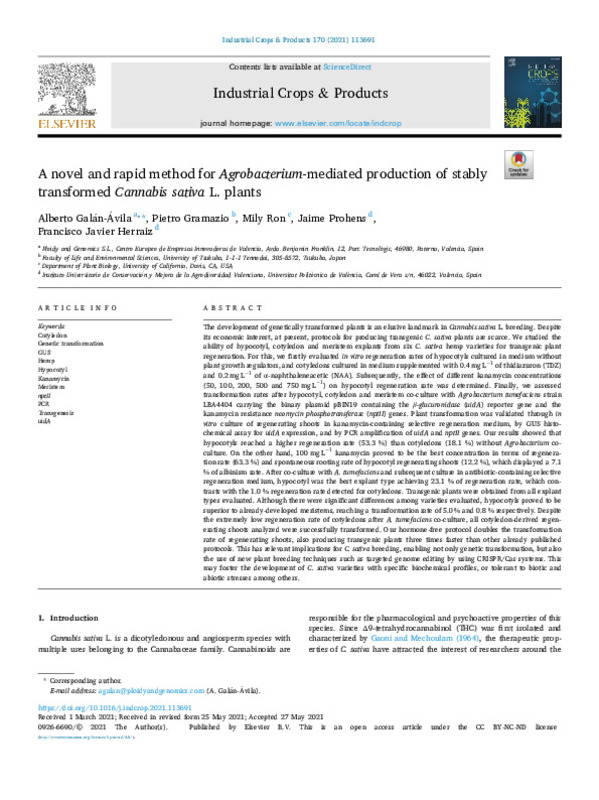JavaScript is disabled for your browser. Some features of this site may not work without it.
Buscar en RiuNet
Listar
Mi cuenta
Estadísticas
Ayuda RiuNet
Admin. UPV
A novel and rapid method for Agrobacterium-mediated production of stably transformed Cannabis sativa L. plants
Mostrar el registro sencillo del ítem
Ficheros en el ítem
| dc.contributor.author | Galán-Ávila, Alberto
|
es_ES |
| dc.contributor.author | Gramazio, Pietro
|
es_ES |
| dc.contributor.author | Ron, Mily
|
es_ES |
| dc.contributor.author | Prohens Tomás, Jaime
|
es_ES |
| dc.contributor.author | Herraiz García, Francisco Javier
|
es_ES |
| dc.date.accessioned | 2022-09-20T18:03:36Z | |
| dc.date.available | 2022-09-20T18:03:36Z | |
| dc.date.issued | 2021-10-15 | es_ES |
| dc.identifier.issn | 0926-6690 | es_ES |
| dc.identifier.uri | http://hdl.handle.net/10251/186403 | |
| dc.description.abstract | [EN] The development of genetically transformed plants is an elusive landmark in Cannabis sativa L. breeding. Despite its economic interest, at present, protocols for producing transgenic C. sativa plants are scarce. We studied the ability of hypocotyl, cotyledon and meristem explants from six C. sativa hemp varieties for transgenic plant regeneration. For this, we firstly evaluated in vitro regeneration rates of hypocotyls cultured in medium without plant growth regulators, and cotyledons cultured in medium supplemented with 0.4 mg L- 1 of thidiazuron (TDZ) and 0.2 mg L- 1 of ¿-naphthaleneacetic (NAA). Subsequently, the effect of different kanamycin concentrations (50, 100, 200, 500 and 750 mg L- 1) on hypocotyl regeneration rate was determined. Finally, we assessed transformation rates after hypocotyl, cotyledon and meristem co-culture with Agrobacterium tumefaciens strain LBA4404 carrying the binary plasmid pBIN19 containing the ß-glucuronidase (uidA) reporter gene and the kanamycin resistance neomycin phosphotransferase (nptII) genes. Plant transformation was validated through in vitro culture of regenerating shoots in kanamycin-containing selective regeneration medium, by GUS histochemical assay for uidA expression, and by PCR amplification of uidA and nptII genes. Our results showed that hypocotyls reached a higher regeneration rate (53.3 %) than cotyledons (18.1 %) without Agrobacterium coculture. On the other hand, 100 mg L- 1 kanamycin proved to be the best concentration in terms of regeneration rate (63.3 %) and spontaneous rooting rate of hypocotyl regenerating shoots (12.2 %), which displayed a 7.1 % of albinism rate. After co-culture with A. tumefaciens and subsequent culture in antibiotic-containing selective regeneration medium, hypocotyl was the best explant type achieving 23.1 % of regeneration rate, which contrasts with the 1.0 % regeneration rate detected for cotyledons. Transgenic plants were obtained from all explant types evaluated. Although there were significant differences among varieties evaluated, hypocotyls proved to be superior to already-developed meristems, reaching a transformation rate of 5.0 % and 0.8 % respectively. Despite the extremely low regeneration rate of cotyledons after A. tumefaciens co-culture, all cotyledon-derived regenerating shoots analyzed were successfully transformed. Our hormone-free protocol doubles the transformation rate of regenerating shoots, also producing transgenic plants three times faster than other already published protocols. This has relevant implications for C. sativa breeding, enabling not only genetic transformation, but also the use of new plant breeding techniques such as targeted genome editing by using CRISPR/Cas systems. This may foster the development of C. sativa varieties with specific biochemical profiles, or tolerant to biotic and abiotic stresses among others. | es_ES |
| dc.description.sponsorship | The authors received no specific funding for this work. Pietro Gramazio is grateful to Japan Society for the Promotion of Science (JSPS) for a post-doctoral grant (P19105, FY2019 [Standard]) | es_ES |
| dc.language | Inglés | es_ES |
| dc.publisher | Elsevier | es_ES |
| dc.relation.ispartof | Industrial Crops and Products | es_ES |
| dc.rights | Reconocimiento - No comercial - Sin obra derivada (by-nc-nd) | es_ES |
| dc.subject | Cotyledon | es_ES |
| dc.subject | Genetic transformation | es_ES |
| dc.subject | GUS | es_ES |
| dc.subject | Hemp | es_ES |
| dc.subject | Hypocotyl | es_ES |
| dc.subject | Kanamycin | es_ES |
| dc.subject | Meristem | es_ES |
| dc.subject | NptII | es_ES |
| dc.subject | PCR | es_ES |
| dc.subject | Transgenesis | es_ES |
| dc.subject | UidA | es_ES |
| dc.subject.classification | GENETICA | es_ES |
| dc.title | A novel and rapid method for Agrobacterium-mediated production of stably transformed Cannabis sativa L. plants | es_ES |
| dc.type | Artículo | es_ES |
| dc.identifier.doi | 10.1016/j.indcrop.2021.113691 | es_ES |
| dc.relation.projectID | info:eu-repo/grantAgreement/JSPS//P19105/ | es_ES |
| dc.rights.accessRights | Abierto | es_ES |
| dc.contributor.affiliation | Universitat Politècnica de València. Instituto Universitario de Conservación y Mejora de la Agrodiversidad Valenciana - Institut Universitari de Conservació i Millora de l'Agrodiversitat Valenciana | es_ES |
| dc.contributor.affiliation | Universitat Politècnica de València. Departamento de Biotecnología - Departament de Biotecnologia | es_ES |
| dc.description.bibliographicCitation | Galán-Ávila, A.; Gramazio, P.; Ron, M.; Prohens Tomás, J.; Herraiz García, FJ. (2021). A novel and rapid method for Agrobacterium-mediated production of stably transformed Cannabis sativa L. plants. Industrial Crops and Products. 170:1-15. https://doi.org/10.1016/j.indcrop.2021.113691 | es_ES |
| dc.description.accrualMethod | S | es_ES |
| dc.relation.publisherversion | https://doi.org/10.1016/j.indcrop.2021.113691 | es_ES |
| dc.description.upvformatpinicio | 1 | es_ES |
| dc.description.upvformatpfin | 15 | es_ES |
| dc.type.version | info:eu-repo/semantics/publishedVersion | es_ES |
| dc.description.volume | 170 | es_ES |
| dc.relation.pasarela | S\439291 | es_ES |
| dc.contributor.funder | Japan Society for the Promotion of Science | es_ES |








